|
|
|
|
This Just In...News
From The Agony Column
|
|
Preview for Podcast of Monday, April 16, 2007: The problem was
much bigger than that.
Here's
an MP3 preview
of the Monday April 16, 2007 podcast for The Agony Column. Enjoy!
|
|
04-13-07: David
Shipley and Will Schwalbe Suggest You Don't Simply Press 'Send'
|
'The Essential
Guide to Email for the Office and Home'
|
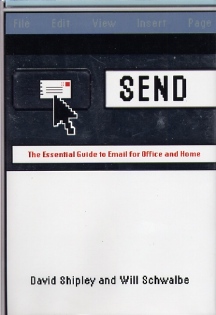
|
Maybe
they should have called it "DON'T Send".
|
It's too late for me.
Some ten years ago, I would have ordered fifty copies of this book and given
one to every manager, programmer and a second copy to those managers, in
case they missed the first. The second copy to be delivered with a swift
swing upside the skull, just to make sure it got through. In my IT management
days, this book would have saved me hundreds of hours of plucking should-never-have-sent-them
emails from the server. It might have salvaged a couple of careers as well.
Not mine, but that's another story. The story in 'Send: The Essential Guide
to Email for the Office and Home' by David Shipley and Will Schwalbe (Alfred
A. Knopf / Random House ; April 10, 2007 ; $19.95) is as simple as S. E.
N. D. That's Simple, Effective, Necessary, Done. And not nearly so simple
as anyone ever thinks it to be.
For many of us, email is supposedly "old hat", and those
who think so are the most in danger shooting themselves with the
deadliest weapon the
21st century has thus far offered humankind. Like most weapons, email looks
deceptively safe. Any day's headlines will tell you it is anything but. David
Shipley and Will Schwalbe have gone out and put together a concise and beautifully
laid out guide that is certain to prevent you from sending at least one tragically
stupid email. And that's worth more than any amount of money.
'Send' is divided into eight smart sections. The introduction asks
and answers the question, "Why Do we Email so Badly?" The reasons are not what
you’d expect. We then go through the sort of tutorial that should be
given to every user before they are given access to their email account.
The authors discuss "When Should We Email", "The Anatomy of
an Email", "How to Write (the Perfect Email)", "The Six
Essential Types of Email", "The Emotional Email" (uh-oh), "The
Email That Can Land You In Jail" (read this one twice) and "S.E.N.D." An
VERY informative appendix tells you "How To Read Your Header" and
Notes make sure that every "i" is dotted and "t" is crossed.
Unlike most emails you send.
The best thing about 'Send' is, well, two things. One, it is written in lively
prose and an engaging style that keeps it from being dry, stupid, corny or
preachy. You've read enough of those memos, trashed and emptied the trash
with those helpful emails about email, and you absolutely don’t need
to see them or deal with them again. Two, it's laid out so you can read it
over your upcoming two-hour lunch. The look of the book is as forthright
and engaging as the prose.
I don’t have to flog the headlines we could have been spared
were certain parties to have read this book. Trust me, the times
they will change and
the morons who use email to perform an electronic immolation of their lives
and careers will just keep marching on. You can pick up this book for a song,
read it in an afternoon and profit from the advice therein for a lifetime.
As opposed to the life sentence you might receive should you ignore that
advice.
|
| |
|
04-12-07: Lorenzo Carcaterra Follows 'Apaches'
With 'Chasers' ; A Review of 'The Ghost Brigades' by John Scalzi
|
Blood, Grit and Fermented Body Parts
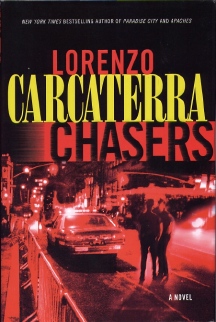 |
|
| Decent
covers? We don't need no stinkin' decent covers. |
Just in case you
haven't read any books in which the phrase "watching the dead burn
bullshit" is to be found of late, here's a pointer to the only
game in town. Lorenzo Carcaterra opened up fire on the literary world
with 'Sleepers',
then locked, loaded and did the ready-fire-aim thing with 'Apaches'.
This gruesome bit of mayhem brought him to the attention of Satan himself,
followed
quickly by Hollowood, which turned 'Sleepers' into a movie and the
headline-ripping TV series Flawed & Sordid into a career for Carcaterra.
There's a whole lot of ripping going on in Carcaterra's world. Still,
he apparently has
enough time to bring back the Apaches for 'Chasers' (Ballantine Books
/ Random House ; April 24, 2007 ; $25.95). If you haven't visited Over
The
Top, New York recently to hobnob with the sort of folks who'd just
as soon put out a ciggie in your eye as give you the time of day, well,
here’s
your chance. You have the right to remain silent and read.
Let's ratchet back 22 years, making it 1985. A brutal slaying is on
the menu in a Manhattan restaurant. Giovanni "Boomer" Frontieri's
niece is down, and this brings in the Apaches, former NYPD cops who seem
to be bullet magnets. They'll be pursuing justice, not vengeance in the
guise of some Colombian coke merchants. Many deaths and much explicit violence
follows. Then some more. Some torture sort of stuff. Now you’re
on page 27.
Suffice it to say that Carcaterra does not play around when it comes
to plotting. Kill first, ask for plot points later and try to avoid
the arterial
blood spurts when one comes into contact with such delightful folks
as the Boiler Man. You know, I never want to meet a fellow who gets
nicknamed
The Boiler Man, do you? It just can't be a good sign. He's just the
sort of gent who might take a few days to kill someone as a career-builder.
And those wine casks at the back of the basement? Don’t ask. I won’t
tell. Suffice it to say it's an uncommon vintage.
Carcaterra has the pulp knob turned to eleven, and noir dialed down
to break-your-toes-on the-way-to-the-bathroom black. With characters
like
Rev. Jim ("I'm what the doctors call an EDP, and you need to be careful
how you talk to somebody's got that." "What the fuck is an EDP?" "EDP
is an emotionally disturbed person...But don't worry–the doctors
think I'm cured!") and Dead-Eye (he's a good guy), we're talking
streets that left mean behind. This is not simply grit. It's ground
glass. So if
subtle is your cuppa, then this is not. On the other hand, if you're
the kind of hammer that thinks the world is just one big fuckin' nail,
then
it's time to start pounding. Or better still, reading about pounding,
as that's far less likely to get you pounded on.
'Chasers' is unapologetically not ripped from any headlines, though
lots of ripping is involved. But Carcaterra has a feel for the streets
and the
dialogue that makes this bullet ballet go down easier than anything
in the novel itself goes down. Mostly what happens here is violent,
unnecessary
and thoroughly unenlightening. You will not understand humanity any
better after reading this novel. You may have a much better feel for
the scum
of the earth and those who choose to scrape the scum from the streets.
Scum is not all that is scraped in 'Chasers'. Don’t bother with
the surgical glove shit here. This is not going to be neat and tidy.
Evidence,
schmevidence. A loaded gun and bug-eyed drug lord, it's like, American
as Mom and Apple pie.
|
Shoot an Alien, Shed a Tear
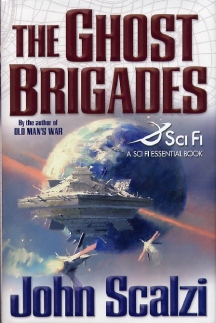 |
|
| Ciover
artist John Harris channels the 1970 is perfect post-millennial
style. |
I'll
try to be as economical with this introduction the review of John
Scalzi's 'The Ghost Brigades' as Scalzi himself is in
the novel. I just read this kick-ass, take-no-prisoners sequel to his
acclaimed 'Old
Man's War'. Yes, the Heinlein vibe is strong here. Yes,
you may want
to go out and shove this book down the gullet of some Hollowood types
who are without doubt making, bad stupid space movies when they could
be filming
Scalzi's work. But don’t let any of that stop you from a) reading
the review of 'The Ghost Brigades' and b) buying 'The Ghost Brigades'
and reading it right this damn minute. Whereas much of 'Old Man's War'
was
(not surprisingly, given the title) an alien-killing mediation on the
aged and their role and feelings, 'The Ghost Brigades' contemplates
the other
end of the human spectrum. Babies. That's right GUYS, this book is
about babies.
Sure, gun-totin', alien-shootin' babies, but – there you
go. Rest assured that thought he book deals with both astronauts and
babies, there is nary a diaper to be found here. You will enjoy lots
of action
and some very nice espionage / wartime-shenanigan twists. Eventually,
one hopes they'll make movies of these books, and they'd better do
it right,
because otherwise a bunch of angry old men are going to tear the filmmakers
a new one. In blogs and such, but still. Blogs can be cruel. John Scalzi,
himself a blogger, should know quite well.
|
| |
|
04-11-07: Chaz Brenchley Maps the 'River of
the World'
|
Wish Granted
|
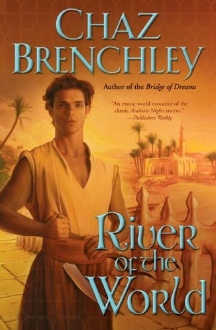
|
Gritty
fantasy...with sand.
|
Chaz Brenchley is
a UK writer who started out writing crime and horror fiction and did
it particularly well. But as we all know, the bottom
dropped out of the horror market, leaving not just readers but writers
high and dry. Brenchley re-invented himself as a fantasy writer,
where his talents for giving his work an edge came in handy. He came
back with
the Outremer series, published in the UK as 'The Tower of the King's
Daughter', 'The Feast of the King's Shadow' and 'Hand of the King's
Evil'. Each of these books, as published by Orbit in the UK, was some
600-plus
pages long. In an early example of the noxious practice of book-splitting,
the same series was published as six mass-market paperbacks in the
US. What's worse, is that they came out one book at a time, so you’d
really only get Eric the half-a-book to read. What could make a reader
more angry than coming up on a full stop in the middle of a narrative,
a false stop not written by the author? For this reader nothing,
and Brenchley's books were such a fine fantasy trilogy, it seemed an
evil
to chop 'em up and dole 'em out like candy-coated drugs. It was a
way to ensure that a fine writer failed to reach an audience. Give
the audience
the first half of the first novel and see if they like reading half
a book.
Fortunately, the ploy apparently failed. When these books were being released
and I wrote about them, I expressed my hope that Brenchley, who is clearly
a cut above lots of the corporate fantasy out there, would get a shot at
having a whole book published in hardcover. Well, wish granted. His new
series Selling Water by the River and book two has just been released here
in the US. 'River of the World' (Ace / Penguin Putnam ; April 3, 2007 ;
$24.95) follows on 'Bridge of Dreams' with the story of Issel, a man with
an affinity for water . The Marsai have erected the bridge, having conquered
the Sundain. Issel has led a band of freedom fighters (read: terrorists)
trying to break the magic bond that links two cities from Sund to Marsai.
Like all great writers, Brenchley's biggest asset is his gorgeous language,
his ability to write prose that captures the reader and creates a new world.
Yep, it's worldbuilding, but the world that Brenchley creates is so full
of life and detail that it transcends reality and colors the perception
of our world. Brenchley eschews the usual sentimentality for hard-edged
fear and hard choices that offer equally unpleasant alternatives.
Of course having offered readers a nice slab of hardcover, Ace did
have to hobble Brencheley with a well-rendered but rather namby-pamby
cover
image that really does not to this reader suggest the gnarly nature
of Brenchley's writing. So 'River of the World' does look like every
other
fantasy out there, but don’t blame Brenchley, or even, I would
guess, cover artist Tim O'Brien. Don’t let the image put you
off. Just be glad that Ace hasn’t decided to split the book into
two parts, though that may in part be due to the fact that at a sub-400
page length,
it's
pretty short for a slab of fantasy. Buy it read it and make wish, this
time that Brenchley gets cover where the gritty nature of the work
within is not shown as ... sand.
|
| |
|
04-10-07: Brian Lumley Opens 'The House of Cthulhu' to Find
'A Coven of Vampires' ; A Review of John Shirley's 'The Other End'
|
Don't f'tagn to Buy
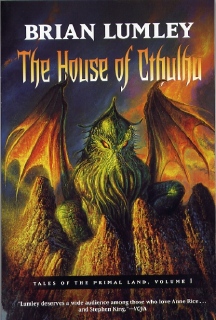 |
|
| A
plague upon ... well, not his house. |
Brian Lumley is
chameleonic, shifting prose tone and style with utter aplomb. One moment,
he's writing big-screen B-movies like the Necroscope series,
gritty
action novels with supernatural, science-fictional themes, the next,
closely observed horror stories, then a formally written heroic fantasy.
Readers
looking for evidence need look no further than 'A Coven of Vampires'
(Subterranean Press ; June 2007 ; $35 ; Signed) and 'The House of Cthulhu'
(Tom Doherty
/ Tor Books ; April 3, 2007 ; $14.95). Between those two titles readers
will find more Brian Lumleys than they'll know what to do with. While
both are
reprints, the originals are now either hard to find or exceedingly expensive
or both. You can pick up the pair for less than either one might cost
you should you seek them out used.
'The House of Cthulhu' was originally published in 1984 by Paul Ganley
Books, operating out of Buffalo, New York. Ganley was a wonderful member
of the
small presses that burgeoned during the horror boom of the 1980s. Ganley
published lots of limited edition hardcover Lumley novels and the justly-acclaimed,
World Fantasy Award winning Weirdbook, where stories from both 'A Coven
of
Vampires' and 'The House of Cthulhu' first appeared. Yes, I went through
my Ganley obsession years back then, buying the hardcovers from Aladdin
Books in Fullerton, California and from Mark V. Ziesing. I have lots,
but not all
of them, and as you can imagine, I regret those I did not buy, including,
alas, 'The House of Cthulhu'. So having the chance to get this in a paperback
is really very cool. And whoever is doing the publicity for this is doing
an ace job. The sheet I got with the books shouts, "The weird, wonderful,
horrifying world of the Primal Land–Now available in trade paperback!" Of
course! Cthulhu f'tagn!
But he's not f'tagn in the usual sense here. Lumley wrote, as
I indicated above, in a variety of styles. 'The House of Cthulhu' showcases
his ornate
heroic fantasy, which will appeal to fans of Clark Ashton Smith, Lord
Dunsany and the works Lovecraft wrote in manner reminiscent of these
contemporaries.
This is not the sort of fantasy we get today, all walking around and
socialized with grit and dirt. The fantasy you'll find in 'The House
of Cthulhu' is
much closer in tone and feeling to the romantic poetry and the works
of Edgar Allen Poe from whence Dunsany, Smith and Lovecraft drew their
inspiration.
'The House of Cthulhu' begins with a geographic description of the world
of Theemh'dra, wrapped into a framing device that involves an island
rising off the coast of Iceland. Once you get to the meat of the matter,
expect
ten stories chock full of eldritch prose and eldritch horrors. Do not
expect the slime-wielding monsters that haunt the Necroscope series.
Instead, look
for old-style poetic-prose and fast-paced action leavened with an undercurrent
of wicked humor. Lumley's heroic fantasy is not for all tastes, but for
those who enjoy the work, it's the grain alcohol of high fantasy. Very
high fantasy
indeed, aided and abetted by the lovely Bob Eggleton cover. Is it, as
Lovecraft once famously asked, "a drawing from real life"?
|
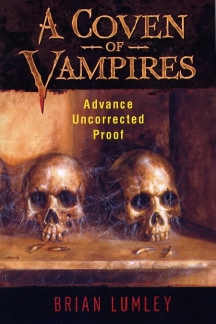
|
Alas,
poor Yorick, turns out he was vampire.
|
'A
Coven of Vampires' is probably more familiar territory for Lumley fans,
featuring stories from that span twenty years of Lumley's career, and no
stories that spin from the Necroscope series. Instead, expect a variety of
tales in a variety of modes. Remembering that Lovecraft himself wrote much
of his oeuvre in an effort to get pas the typical vampire story, it's surprising
to find a few of Lumley's Cthulhu mythos tales here. You'll also find a couple
of high-fantasy style stories and lots of other examples of why Lumley is
held in high regard by horror readers.
'A Coven of Vampires' was originally published by specialty press Fedogan & Bremer
in a run so limited that unsigned copies of the original are going for
no less than $200 via Bookfinder. Subterranean Press is upping the ante
and
going for another classic with a print run of just 1,000 copies, all
signed by Lumley with the original Eggleton cover and new vignette illustrations
by Eggleton as well. If you don't have the original, and perhaps even
if
you do, this seems like a steal at $35. You
can read my original review here, and the 2007-updated
review of the new edition here.
Both books point out a valuable lesson when it comes to making your book-buying
decisions. Should you see a reasonably priced, fairly limited edition
by an author that you like, you’d be well advised to buy the damn thing
now and worry later. In the first place, you're almost always going to get
a better reading experience with the small press edition, and in this case,
you’re going to save yourself some money as well. Fedogan & Bremer
are still out there publishing, and Subterranean Press is a vital force.
Don’t let the chameleonic small press slip by unnoticed. It's a wild
environment out there. Turn over some leaves of the sorts you'll find between
hard covers and snag what you can. Books are worth hunting down, they’re
worth your valuable time.
|
Platonic Apocalypse
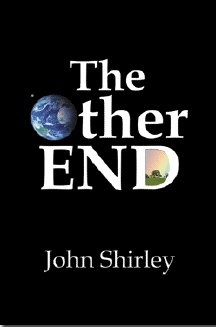 |
|
| Beware
of world. Plato will getcha! |
Leave it to John
Shirley to take on the Cash Machine that is the "Left
Behind" series. Does that make 'The
Other End' the Anti-Cash Machine?
One hopes not! To my mind, the number of readers who would buy into
the Platonic invasion on display in 'The Other End' should far outnumber
at
least the initial print run of the novel. The outrage that is likely
to result as word of 'The Other End' gets round should ensure that
there will
be anti-readers out there willing to buy the book just to burn it.
Not that I would advocate book-burning, but I certainly might expect
that an
unabashed polemic that targets the hypocrites who seem to be in charge
would be on the receiving end of a few literal as well as literary
flamethrowers.
You can read
my review of the book here, and you can hear
Shirley speak about the book here. I'd advise both, followed by
a long spring afternoon caught up in Shirley's exciting end of the
world. This is not the end of
the world as we've ever seen it before. It's a brave thought experiment
that is incidentally as hell of a lot of fun to read. Obviously the
end is near, and you're well-advised not to f'tagn for Cthulhu
and his minions to pick over what’s left. It's my guess that
in the perfect world to follow, first editions of 'The Other End' will
be worth more than a pretty
penny or a silver samolian. I'll leave the precise amount to my reader's
imaginations.
|
| |
|
04-09-07: A 2007 Interview With John Shirley
|
"It's Dangerous
To Be Aware"
|
|
A
dangerous man with an even more dangerous mind.
|
Well, it's dangerous to be aware of John Shirley,
at any rate, something that will become quite apparent when you listen
to his intense, and intensely
funny reading from 'The Other End', his transformation of the Apocalypse
into an invasion of Platonic ideals. Visceral ideals, to be sure, but
the sort of ideas, at least that are hard to forget when rendered in
the context of an action-packed re-ordering of the world. "If God
came to you and said, "I need a consultant," Shirley told me, "and
can you tell me, because...this is such a mess, how am I going to re-arrange
things?"
'The Other End' offers readers a glimpse at an alternative apocalypse,
what Shirley said could be described as liberal apocalypse. "I feel
that we should all be given access to that kind of thought experiment, " he
adds. As thought experiment goes, 'The Other End' is anything but dry
and actually pretty damn brave. It's also fun to read, unless of course,
you’re inclined to think it should be set afire.
This of course makes the interview the perfect Easter Sunday Gift to
my readers. We talk about 'The Other End' and Shirley's forthcoming collection
from Prime Books, 'Living Shadows'. The interview is thorough and all
too entertaining, so I'm going to hand you over immediately to the MP3
podcast or the RealAudio files. Both contain extensive back-masked hidden
and subliminal messages guaranteed to cause intense hallucination in
susceptible individuals. Consider yourself susceptible if you’re
breathing.
Shirley is an icon in the field who offers some fascinating thoughts
on thought experiments and his personal views on addiction and drugs.
The interview also includes tracks of his music with Obsession and The
Panther Moderns, as well as a look at the resurrection of the Mabuhay
Club via the Mabuhay Music Label.
This is surely the most rock and roll interview I've done since...the
last time I talked to Shirley. Just don’t
blame me if you get The Panther Pit stuck in your brain.
|
| |
|
|







